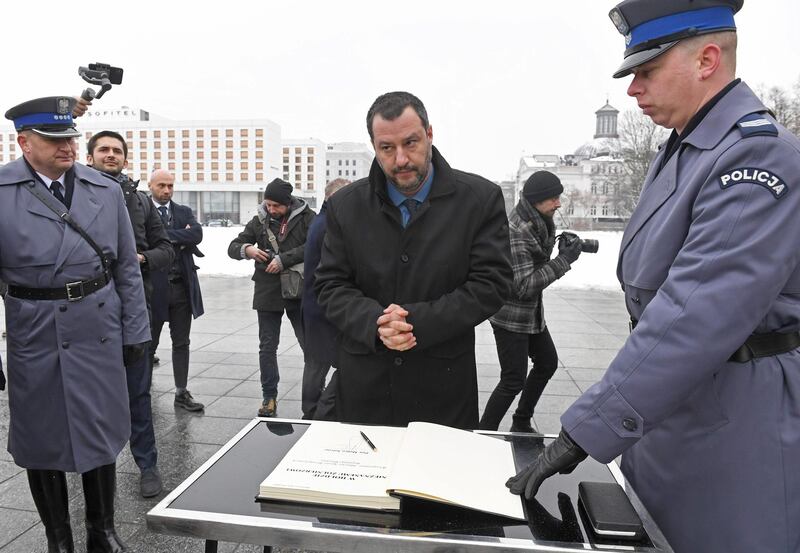Italian Interior Minister and populist leader Matteo Salvini visited Poland on Wednesday as part of a broader effort to rally his troops against pro-EU forces ahead of the bloc’s parliamentary elections in May.
Mr Salvini’s scheduled meeting with Law and Justice leader Jaroslaw Kaczynski follows months of talks by the Italian firebrand and his emissaries to forge an Eurosceptic alliance in preparation for what he calls “the battle of battles.”
The encounter will test whether populist leaders can effectively set aside some of the thorniest differences in their national agendas. While the two leaders share a staunch anti-migrant sentiment and aversion to EU institutions, they do not see eye to eye on a number of issues, above all the relationship with Vladimir Putin’s Russia.
Italy’s League went from staunch critic to one of Russia’s closest allies since Mr Salvini took the reins of the party in 2013. The newly formed axis between Rome and Moscow is often celebrated by Italy’s nationalist-in-chief in his tweets. “In Russia I feel home, whereas in some other European countries I don’t,” he once said.
For Mr Kaczynski's, leader and co-founder of Poland’s ruling party, the friendship is hard to swallow. Mr Kaczynski and his loyalists have successfully built a conspiracy around the death of his twin brother, who was the country’s president when he was killed in an air crash in 2010 on the way back from Russia.
____________________
Read more:
Mental health fears for migrants stranded off Malta
2018: The year populism tightened its grip across Europe
____________________
If Poland’s enemies are traitors and its defenders are heroes, joining forces with a Russian ally runs the risk of tarnishing the notion of Poland being eternally under siege – and therefore in need of saviours.
Mr Salvini and Polish Minister of Interior Joachim Brudzinski discussed cooperation and common fight against organized crime before visiting the tomb of a World War II soldier, where the Italian representative signed a memory book. He was then expected to join Mr Kaczynski for further talks on the electoral alliance.
Pro-EU forces headed by French President Emmanuel Macron and German Chancellor Angela Merkel see a populist coalition as a threat to Europe’s democratic values. Since the Law and Justice government was elected in 2015, it has cracked down on a number of civil liberties by attributing Poland’s problems to the machinations of unseen forces. Similarly, the Polish leg of Mr Salvini’s populist tour came as Italy’s democracy also suffered a blow, dropping from 21st to 33rd position in the Economist Intelligence Unit's 2018 Democracy Index.
Since the League formed a government coalition with the anti-establishment Five Star Movement (M5S) in March last year, it has enforced discriminatory policies that attracted criticism by the European Court of Human Rights.
Among them is the closure of Italian ports to NGO rescue ship assisting migrants at sea. During his visit to Warsaw, Mr Salvini slammed a deal on rescued migrants brokered by the European Union to solve an impasse that has left 49 migrants stranded aboard private rescue ships since last month.
The deal, announced by Maltese Prime Minister Joseph Muscat on Wednesday, sees EU countries including Italy taking in the 49 asylum-seekers, as well as many of the 249 migrants already in Malta.
The Italian Interior Minister rejected the deal saying he "absolutely" opposed new migrant arrivals in Italy, clashing with his own premier Giuseppe Conte who had agreed to take in 15 rescued migrant children and their parents.
Germany is expected to take in 60 migrants who are currently in Malta or who are about to arrive there as part of the deal.
M5S leader Luigi Di Maio also met with representatives of populist parties during a gathering in Brussels on Tuesday. A picture posted on social media portrays him with Polish punk rock musician turned politician Paweł Kukiz, who leads the Kukiz'15 party, as well as Croatian Ivan Sinčić and the Finnish Karolina Kahonen. “These are the leaders of movements that are giving their countries an alternative to traditional parties,” Mr Di Maio said. “They are the freshest and nicest energies in Europe.”






